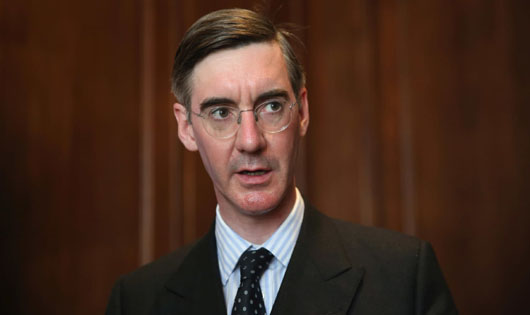by WorldTribune Staff, August 19, 2018
A conservative faction in UK parliament has indicated it favors a clean break from the European Union and may not support the Brexit deal being proposed by Prime Minister Theresa May.
Jacob Rees-Mogg, chair of the European Research Group, a faction within May’s Conservative Party, is strongly opposed to the so-called Chequers plan for Brexit on March 29 next year.

“If she sticks with Chequers, she will find she has a block of votes against her in the House of Commons,” Rees-Mogg, considered a possible successor to May, told The Sunday Times on Aug. 19, describing the Chequers proposal as “surrender” to the EU.
“Of course the Eurosceptics in parliament are not in a majority on all issues, but we will inevitably be in a majority on some of them and that will make the legislation extraordinarily difficult if it is based on Chequers,” Rees-Mogg said.
Meanwhile, the co-founder of British clothing brand Superdry announced on Aug. 19 he is financially supporting a push for a second referendum on Brexit, AFP reported.
Julian Dunkerton is pumping £1 million ($1.3 million) into the effort, claiming it is not too late to avert “disaster.”
“It’s not too late,” Dunkerton wrote in The Sunday Times newspaper. “We have a genuine chance to turn this around. There is no vision for Brexit and the politicians have made a mess of it.”
On July 16, Justine Greening, one of May’s former cabinet ministers, proposed a second Brexit vote with three options: stay in the EU; accept the deal that May agrees on with Brussels; or leave with no deal.
Tom Watson, Labour’s deputy leader, said on July 15 that a new referendum is not Labour’s policy and that parliament should sort out Brexit, but added that “to take [a second referendum] off the table completely, when there might be a set of circumstances where Parliament cannot deliver a meaningful vote, would be a mistake.”
Reports say that the Scottish Nationalists would not oppose a second referendum while the Liberal Democrats would vote for one.
May has ruled out the idea of a second referendum.
Dunkerton wrote: “Increasingly, the public knows that Brexit is going to be a disaster. Maybe they just need to be given that little bit of hope that comes when they see how opinion is moving. What I want is to enable people to send this Brexit back.”
In the June 2016 referendum, 52 percent of eligible British, Irish and Commonwealth voters opted for Britain to leave the EU.
“I will be paying for one of the most detailed public polling exercises ever undertaken by a campaign, so more of us have the confidence to demand the democratic right for our voices to be heard — to get a people’s vote on any Brexit deal,” Dunkerton wrote.
Under May’s Chequers plan, Britain would remain in a free trade zone with the EU for manufactured and agricultural goods. Some Brexit supporters said the plan would mean parts of the British economy would still be subject to rules set by the EU.
If May cannot get a deal by the Oct. 18 EU Council, an agreement could be reached at the Dec. 13-14 EU Council.
Rees-Mogg said letting it run to December would be “very risky” and would mean May’s government “must come forward with a deal that Brexiteers like, because otherwise they might find it’s much harder to get through parliament than they think.”
Parliament will have two votes: one on the Brexit deal and one on the Withdrawal Agreement and Implementation Bill.
May “is betting that the fear of a so called ‘no-deal’ scenario will push many Conservative and Labour lawmakers to support a deal, but the numbers are tight,” Reuters noted in an Aug. 19 report. “In recent votes, May commanded a majority of around six votes on major Brexit issues.”
Brexit minister Dominic Raab is expected to pick up the pace of talks when he meets with EU chief negotiator Michel Barnier in Brussels on Aug. 21, but May’s government is also stepping up planning for a “no-deal” Brexit.
A “Canada-plus” deal, similar to the EU’s 2016 agreement with Canada but with deeper ties given Britain’s already closer trading links, could win a majority in parliament, Rees-Mogg said.
“If the prime minister came to the House of Commons with a Canada-plus style Brexit, people like me would say, ‘Yes, that’s all right,’ and people who are strongly pro-European would say, ‘Yes, that’s better than leaving on World Trade Organization terms,’ ” Rees-Mogg said. “So although that wouldn’t be what people might choose, it could command a majority.”
Subscribe to Geostrategy-Direct __________ Support Free Press Foundation
